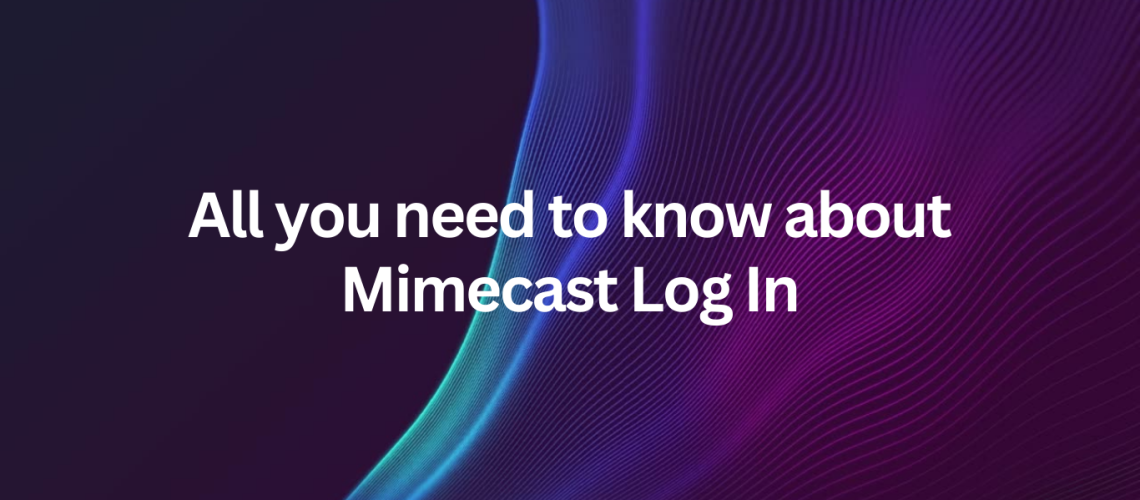Mimecast log in : Mimecast is a leading cybersecurity and email management company that provides cloud-based solutions to protect and manage email and other essential data. Mimecast offers various services to help organizations safeguard their email communications and data, and “Mimecast log in” refers to the process of logging into the Mimecast platform to access these services. Here’s everything you need to know about Mimecast login:
Mimecast log in Services:
Mimecast provides a range of services, including email security, archiving, continuity, and data protection. Users need to log in to access and manage these services.
Also Read: Best Practices for IT Infrastructure Security Policies
Mimecast User Account:
To log in to Mimecast, you must have a Mimecast user account. Typically, Mimecast services are used by organizations, so your IT department or Mimecast administrator will set up your account.
Mimecast Web Portal:
The primary way to access Mimecast services is through the Mimecast Web Portal, a secure online platform. To log in, you’ll need your username and password.
Mimecast Personal Portal:
Users can also access their Mimecast services and settings through the Mimecast Personal Portal, where they can configure their email security preferences, view quarantined messages, and more.
Also Read: Best Practices for IT Infrastructure Security Policies
Mimecast log in Mobile App:
Mimecast offers a mobile application for both Android and iOS devices, allowing users to access Mimecast services on the go. You can log in to the mobile app using your Mimecast credentials.
Logging In:
To log in to Mimecast, follow these general steps: a. Open your web browser and go to the Mimecast Web Portal or the Personal Portal URL. b. Enter your Mimecast username (usually your email address) and password. c. Complete any additional authentication steps if required, such as multi-factor authentication (MFA). d. Once authenticated, you’ll have access to your Mimecast services and settings.
Also Read: Interesting things you should know about cybersecurity analytics
Forgot Password:
If you forget your Mimecast password, you can typically use the “Forgot Password” or “Reset Password” link on the login page to reset it. You’ll receive instructions on how to create a new password.
Security:
Mimecast places a strong emphasis on security. They often implement multi-factor authentication to ensure that only authorized users can access their services.
Also Read: Enhancing Digital Safety With Effective Cybersecurity Solutions
Support:
Mimecast provides customer support to assist users with login issues, technical questions, and any other concerns related to their services.
Logging Out:
It’s essential to log out of your Mimecast session when you’re done to ensure the security of your account. Most Mimecast platforms have a “Log Out” option.
Remember that the specific steps and procedures for logging into Mimecast may vary depending on your organization’s configuration and security policies. If you encounter any issues or have questions about Mimecast login, it’s best to contact your organization’s IT department or Mimecast support for assistance.
Also Read: How to find the best cybersecurity consulting companies in Dubai?
Top benefits of using mimecast email cybersecurity
Mimecast is a well-regarded email cybersecurity and management solution provider, and using their services can offer numerous benefits for individuals and organizations looking to enhance their email security. Here are some of the top benefits of using Mimecast for email cybersecurity:
Threat Protection:
Mimecast provides robust protection against advanced email threats such as phishing attacks, ransomware, malware, and zero-day threats. Their solutions use advanced threat detection techniques to block malicious emails before they reach the inbox.
Spam Filtering:
Mimecast’s email security solutions include powerful spam filters that help reduce the clutter in your inbox and prevent unwanted emails from reaching you. This improves productivity and reduces the risk of falling for spam-related scams.
Also Read: How to Choose the Best Cybersecurity and Infrastructure Security Agency in Dubai?
Email Continuity:
Mimecast ensures that email communication remains uninterrupted even during server outages or downtime. It provides email continuity services, allowing users to access their emails from the Mimecast cloud in case of an email server failure.
Data Loss Prevention (DLP):
Mimecast offers DLP capabilities to prevent sensitive data from being leaked through email. It scans outgoing emails for sensitive content and can automatically block or encrypt messages containing confidential information.
Email Archiving:
Mimecast provides email archiving solutions that securely store emails and related data for compliance and e-discovery purposes. This ensures that organizations can easily retrieve and audit email communications when needed.
Centralized Management:
Mimecast offers a centralized management console that allows administrators to configure and monitor email security settings for the entire organization from one place, streamlining management tasks.
User Awareness Training:
Mimecast often includes security awareness training as part of its offerings. This educates users about the latest email security threats, phishing attacks, and best practices to avoid falling victim to cyberattacks.
Real-Time Reporting and Monitoring:
Mimecast provides real-time reporting and monitoring capabilities, allowing administrators to track email security incidents, view threat trends, and gain insights into the email traffic to make informed decisions.
Mobile Security:
Mimecast extends its security features to mobile devices, ensuring that emails accessed on smartphones and tablets are also protected against threats.
Scalability:
Mimecast’s solutions are scalable and can accommodate the needs of both small businesses and large enterprises. This scalability makes it a flexible choice for organizations of various sizes.
Compliance and Regulations:
Mimecast helps organizations meet compliance requirements, including those related to data protection and privacy regulations like GDPR and HIPAA, by providing features such as email archiving and data retention policies.
Phishing Simulation:
Mimecast often includes phishing simulation tools to help organizations train their employees to recognize phishing emails and respond appropriately.
Improved Productivity:
By reducing the time and effort spent dealing with spam, security threats, and email downtime, Mimecast helps improve overall productivity within an organization.
In today’s digital landscape, where email remains a primary communication tool and a common vector for cyberattacks, investing in robust email cybersecurity solutions like Mimecast can protect sensitive information, maintain business continuity, and enhance the overall security posture of an organization.



